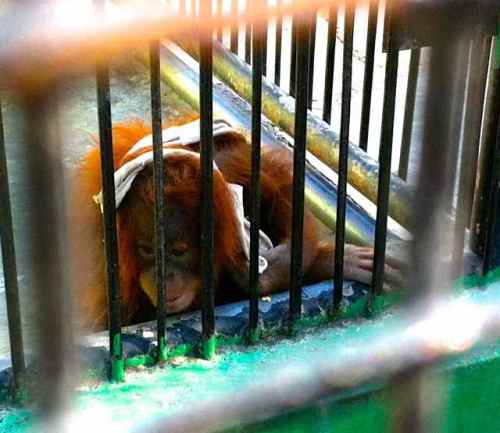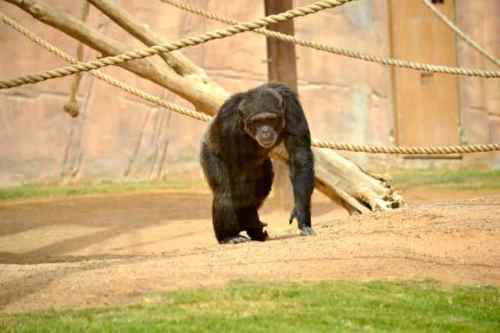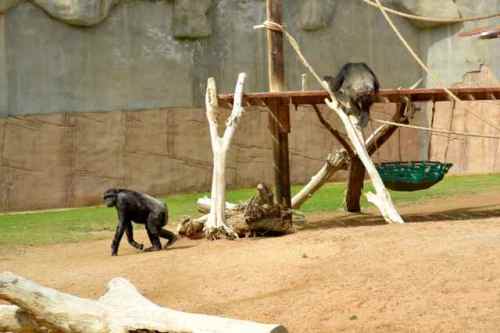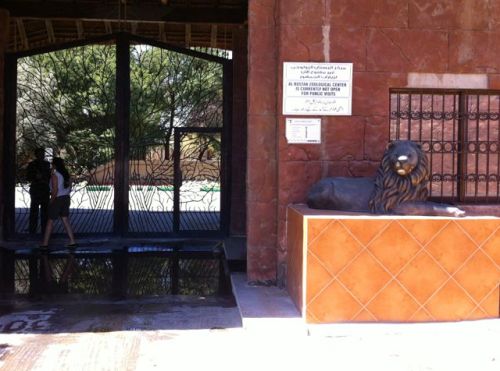PEGAS recently completed eight days of investigations into wildlife trade in the UAE, focusing on great apes. A local NGO assisted greatly.
The UAE is made up of seven emirates, each with its own local government headed by a hereditary sheikh. The federal government is based in Abu Dhabi and the federal President is Sheikh Khalifa bin Zayed Al Nahyan and the Vice President and Prime Minister is Sheikh Mohammed bin Rashid Al Maktoum, Ruler of Dubai.
PEGAS visited the following facilities and individuals:
- The Dubai Zoo – director of the new Dubai Zoo and Safari Park and a Dubai Zoo veterinarian.
- Sheikh Butti bin Juma Al Maktoum Wildlife Centre, Dubai – the manager.
- A Pet Care Clinic, Dubai – The veterinarian owner
- Al Ain Zoo, Abu Dhabi – a veterinarian and a species coordinator.
- Arabia’s Wildlife Centre, Sharjah – a South African weekend manager, spoke to us on short notice.
- Al Bustan Zoological Centre, Sharjah – Closed to the public, but spoke with the guard and later had correspondence with the manager.
- Sharjah Birds and Animal Market
- Environment Agency, Ministry of Environment and Water, Abu Dhabi – Dr. Shaikha Al Dhaheri, Executive Director, Terrestrial and Marine Biodiversity Sector and Pritpal Soorae, Unit Head, Terrestrial Assessment and Monitoring, Terrestrial & Marine Biodiversity Sector.
- We tried to meet with Dr. Ahmed Esmaeil Al Hashmi, head of CITES-UAE and Director, Biodiversity Department, Ministry of Environment and Water, Dubai, but he said that he would have to obtain clearance from the Ministry of Foreign Affairs, which never came.
Dubai Zoo
The current small and cramped Dubai Zoo will be closing down near the end of the year and the animals will be moved to the new, much larger grounds out of town on the road to Sharjah. Press reports indicated that the new zoo and safari park would hold over 1,000 animals, but the new director said the actual number would be closer to 3,000. Many additional animals will have to be legally sourced from zoos and animal dealers. Elephants are also planned, but PEGAS received conflicting information about whether they would be from Asia or Africa.
There are currently 7 great apes in the Dubai Zoo, all held in old cages with concrete substrate and few enrichment amenities. Two gorillas said by the zoo to be of the eastern lowland subspecies (Gorilla beringei graueri) arrived as undocumented infants, which the veterinarian said were the result of illegal trade confiscations. The CITES Trade Database contains no reports of any kind involving any gorilla subspecies for the UAE. The International Studbook for the Western Lowland Gorilla (Gorilla g. gorilla) confirms that the two in Dubai were captured in the wild from an unknown source. The male, Digit, was thought to have been born in 1994 and arrived in the zoo in October 1996. The female Diana was born about 1999 and arrived in January 2000.
Diana is in a particularly bad state and shows signs of severe depression, including grooming herself to the extent that she has pulled out quite a bit of hair on her arms. According to the new director, she has tried to interact with the male, but is rebuffed. The director thinks it’s because the male was captured so young he has not learned how to behave towards females.
PEGAS and a local NGO have made a plea to free the gorillas and relocate them to a sanctuary. Debby Cox of the Jane Goodall Institute (JGI) is assisting in assessing whether this would be possible. The director said that he wishes to have replacement gorillas in place before the Dubai municipality, which owns the zoo, would allow relocation of Digit and Diana. The new zoo plans call for a one-acre (0.40 ha) gorilla enclosure, which could house several gorillas comfortably.
The first order of business is to conduct DNA testing of the gorillas to confirm what subspecies they belong to. Additionally, the Congolese CITES and wildlife authorities (ICCN) must agree to request the return of the gorillas, if indeed they originated in the DRC, and agree that they go to a sanctuary, and a gorilla sanctuary must agree to take them.
The zoo has 4 chimpanzees, 2 each in two cages. None of them are listed in the European zoos chimpanzee studbook. Since 1990, when the UAE joined CITES, only two chimpanzees are reported in the CITES Trade Database as being imported for zoos, one in 1992 and one in 1999. Therefore, at least two of the Dubai chimpanzees were imported illegally. A local NGO will assist PEGAS to work with the zoo to see if more can be learned of the chimpanzees’ origins and when they arrived.
PEGAS requested that the chimpanzees be freed on the grounds that they were imported illegally and are living in poor circumstances, and has offered to assist their repatriation to an appropriate sanctuary in Africa. As with the gorillas, unless replacements can be found, this most likely will not occur. The new Dubai Zoo director intimated that he wishes to display a large group of chimpanzees in the new facility under construction.
There is one baby orangutan that the zoo veterinarian said was dropped off as a 4-5 month-old infant by an unknown person. It appears to be about 2 years old now. There are no records of orangutan imports to the UAE in the CITES Trade Database. It, too, is a victim of trafficking.

The baby orangutan is in a barren cage alone with no enrichment. PEGAS saw it rolling around trying to play.
Sheikh Butti bin Juma Al Maktoum Wildlife Centre
The manager was kind enough to take us on a complete tour of the 17-hectare private breeding centre and wildlife park. The centre has no great apes and does not plan to acquire any. He did know of people who owned great apes, however, and provided information on routes and methods that he was aware of for smuggling illegal wildlife from Saudi Arabia, Oman and the sea into the UAE.
A Pet Care Clinic
The veterinarian owner treats the pets of many wealthy Emiratis and expat residents, including royal family members. The royal families import exotic animals at will, often using their own jet planes. They are not subject to normal CITES and other procedures and there are no authorities that can use legal means to halt the trade. He has made attempts to create awareness about animal welfare issues, but has been warned that he will be made to leave the UAE if he says anything negative about the government. This is a situation that affects all expatriate residents. He knew of illegal pet trading, but could say little specific about it. He did not think that great ape ownership was very common in the UAE.
Al Ain Zoo
The zoo has one gorilla and 7 chimpanzees. The western lowland gorilla, named Lady, was born about 1974 in Cameroon, according to the gorilla studbook, and was captured in the wild. She came to Al Ain Zoo in May 1978 with a male named Maxi, who died around 2006. The male is not in the studbook. Lady is kept in a fairly large enclosure with a grass and earth substrate and good enrichment amenities. There are no bars to the enclosures at Al Ain, but rather a number of reinforced glass windows are set in artificial “rock” walls for viewing. Lady lives in isolation, except for a rabbit that has been put in the enclosure for company. A large group of local boys was taunting the gorilla during the PEGAS visit.

Lady is a western lowland gorilla that arrived at Al Ain Zoo in 1978. She has been alone since about 2006.
The chimpanzees are divided up into two groups, one consisting of 4 that is on view to the public, and 3 others that are kept out of view. All 7 are listed in the European chimpanzee studbook. The origin of 6 is unknown, while one is an in situ birth. The arrival dates do not correspond with any reported dates in the CITES Trade Database, thus all were imported outside of CITES procedures, all but one imported before the UAE joined CITES. The one enclosure on view to the public appeared to be well-maintained with good substrate and enrichment amenities.
As with the Dubai Zoo, the Al Ain Zoo is currently expanding to become a more than 900 hectare wildlife park and resort, dedicated to wildlife conservation education. Hundreds of new animals are being imported to stock the open drive-through safari park, including several white rhinos that have already arrived from South Africa. PEGAS was told no new great apes or elephants are planned to be imported, even though a large, new ape house was being constructed. We asked to be informed if staff at Al Ain hear anything about great ape trade from the dealers they do business with.
Arabia’s Wildlife Centre
PEGAS and MEAF visited this facility on a Friday (the weekend) before it opened at 2 p.m. A workman telephoned the weekend manager, who drove to meet us. He informed us that the centre had no primates other than indigenous hamadryas baboons. The centre breeds wild species found in Arabia and supplies other vetted facilities on request. He said that the centre receives complaints from people about neighbours who keep noisy or dangerous exotic pets, but they advise people to contact the authorities in Sharjah.
Sharjah decreed a new law last November that outlawed private ownership of exotic animals that had been imported illegally. Since the amnesty for handing in animals expired in late December, the centre has been receiving a rash of exotic pets turned in to the government or anonymously dumped at the gate. Since most of them cannot be used for breeding and there is a lack of space to keep them, they are euthanized. They even found a baboon dressed in designer clothes and with a meticulously shaved beard chained to the gate.
As with other informants in the UAE, the manager was reticent to share information about wildlife traffickers and illegal trade, but said that he knew it occurred on a regular basis. The new Sharjah law might curb it.
Al Bustan Zoological Centre
This privately-owned zoo is not open to the public, but the guard at the gate said that chimpanzees had recently been brought and left there by private owners. PEGAS subsequently got into contact with the manager to find out the circumstances surrounding the chimpanzees. The two animals appear to be the result of illegal import as infant pets at least 15 years ago. They were originally kept in the house, but as they grew up and became dangerous they were moved out into an enclosure on the grounds. With the new law, the owners decided to dispose of the pair at Al Bustan.
PEGAS has offered to relocate the chimpanzees to Sweetwaters. The zoo is owned by an advisor to the President of the UAE. The manager said that he would consult with the owner and inform PEGAS of what they decided to do. PEGAS has requested Al Bustan to inform us of any future great ape arrivals.
Sharjah Birds and Animal Market
This infamous pet market has received considerable negative press and sparked campaigns to close it. Mammals, reptiles and birds are crammed into small cages and sold like they were inanimate commodities, not live creatures. It used to contain many exotic species, but since the new law, very few remain. PEGAS saw no primates in a tour of the market. It was deemed a waste of time to enquire about buying great apes, as con men abound there and they would simply spin a tale about how anything wanted could be obtained. It is hoped the absence of exotic animals will be long-lasting.
Environment Agency
PEGAS and a local NGO met with the Executive Director, Terrestrial and Marine Biodiversity Sector, and Pritpal Soorae, Unit Head, Terrestrial Assessment and Monitoring, Terrestrial & Marine Biodiversity Sector. Dr. Al Dhaheri briefed us on the new bill that aims to regulate the possession and trade of predatory, dangerous and semi-dangerous animals and protect people from harm and from spreading animal diseases. She confirmed that great apes were included. The bill has passed many of the lower level stages of approval and is now with the federal cabinet. The Environment Agency expects the bill to become law before the end of 2015 and this will provide the legislative foundation upon which to enforce regulation of the illegal pet trade.
PEGAS raised the issue of airports such as Dubai and Abu Dhabi being used as both destination and transit points for illegal wildlife trade, for example chimpanzees and bonobos that are known to have transited Dubai to go to Armenia. Dr. Al Dhaheri said that the government does not have legal authority to seize anything in transit, but if something illegal was found they would notify the destination country authorities. The government has recently been communicating with the national airlines (Emirates, Etihad and Air Arabia) and obtaining agreements from them not to carry illegal wildlife products. There are a number of royal family, cargo and low-cost airlines registered in the UAE, it is unknown if these were also contacted.
PEGAS has not revealed all of the information that was communicated by the different informants because of requested confidentiality, and because it could compromise ongoing investigations. A trafficker was also found that operates out of Dubai and India and who has posted online numerous great apes, other primates, wild cats, exotic birds, etc. Investigations are ongoing.

















Pingback: Help Us Put Pressure on Qatar to Relocate Abused Baby Chimps to Sweetwaters | Ol Pejeta Conservancy